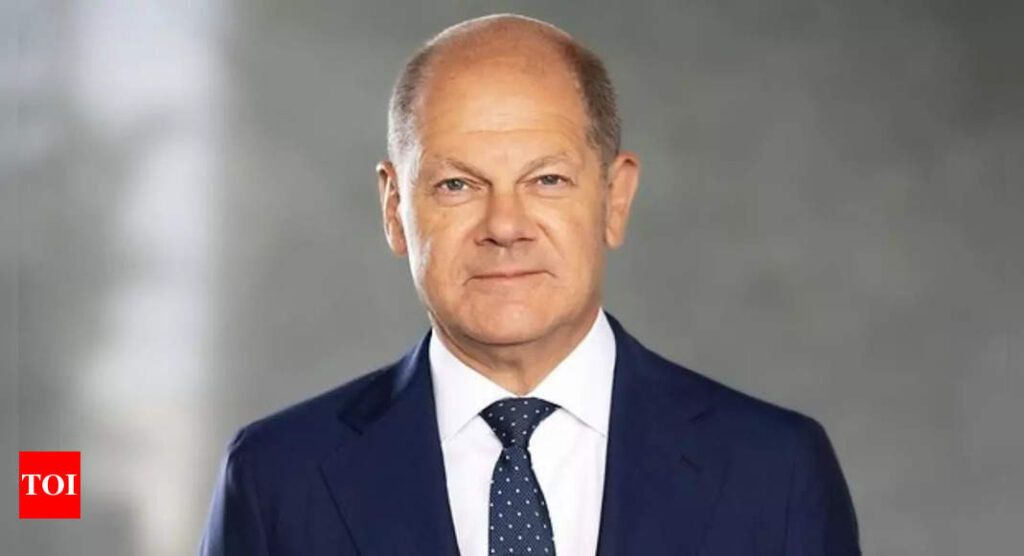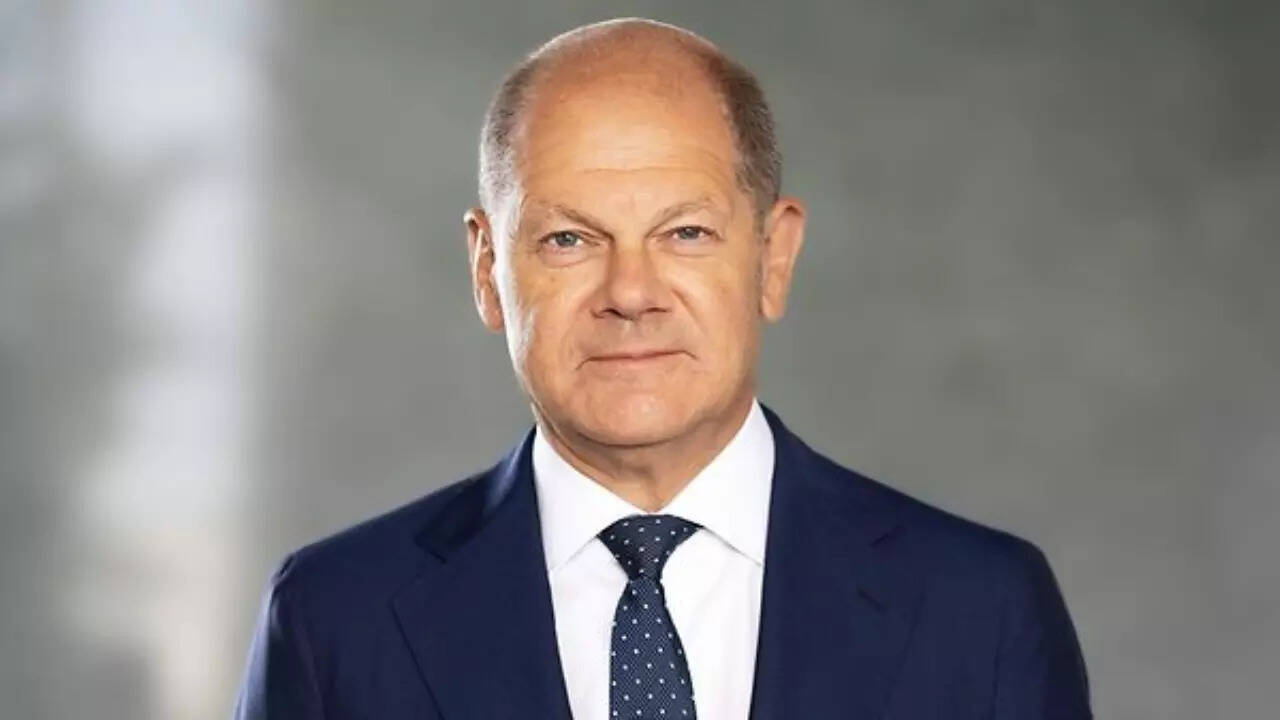Germany committed to Indo-Pacific like never before, will show military presence: Chancellor Olaf Scholz – Times of India

In an exclusive interview with TOI’s Sachin Parashar, ahead of the summit with Modi on Saturday, Scholz sought to address some of India’s concerns about challenges to the rules-based order in Asia by declaring that Germany will show military presence in the region with more deployment, while teaming up with likeminded partners like India. He said never before had there been such a commitment to the Indo-Pacific by Germany. While Germany has agreed to supply Leopard 2 tanks to Ukraine, Scholz said Germany will take care not to become a party to the war and that there must be no war between Russia and NATO.
Excerpts:
Chancellor, this is your first visit to India since you assumed office. What are the areas you want to focus on in the bilateral relationship and are there any specific takeaways you are looking at from the visit?
I am grateful for this opportunity to visit India and I am looking forward to meet Prime Minister Modi again. India is the largest democratic country in the world, and together with Germany among the top five economies of the world, and a strong and powerful partner of Germany and the European Union. Germany strives to further strengthen our bilateral relationship and our cooperation on global issues, such as mitigating climate change and transforming our economies in a just, green and sustainable way. There is huge potential for intensified cooperation, in sectors such as renewables, hydrogen, mobility, pharma, digital economy, and many more. We can learn a lot from each other. Without key countries like India, we won’t be able to limit the global temperature rise enough to keep the 1.5 °C goal of the Paris Agreement in reach and achieve green transformation. We also aim to further deepen our economic relations which is why I am traveling with a high-level business delegation. In that sense, with a future balanced, ambitious, comprehensive and mutually beneficial trade and investment agreement between India and the EU we hope that both sides would benefit even more – which is why we also focus on this topic and strongly support the ongoing negotiations.
This visit also comes during India’s G20 presidency. Please tell us about your expectations from India’s presidency at a time when the world is still reeling under the after-effects of the pandemic and the ongoing Russia-Ukraine conflict.
I congratulate India on taking over the G20 Presidency. The G20 is a key forum for multilateral cooperation and global governance. Germany stands ready to support the Indian presidency in delivering ambitious and concrete outcomes on key global challenges, such as securing strong and sustainable growth, tackling climate change, and fostering sustainable development. The brutal and unjustified Russian war of aggression and full-scale invasion of Ukraine are blatant breaches of the rules-based international order and the United Nations Charter, and undermine the very foundation of the international order based on the rule of law. This war affects us all: Just imagine that a country invading its neighbour becomes an accepted norm! At the last G20 Summit in Bali in November 2022, the G20 sent a strong message in this respect. It will be important to build on that during the Indian G20 Presidency. In particular, G20 needs to continue to address the global implications of Russia’s war of aggression.
India has said it wants to speak for the Global South as the developing world has been impacted most by the food, fuel and fertilizer shortages resulting from the conflict. PM Modi recently chaired a virtual meeting with developing countries to discuss the concerns they had. What do you make of this Indian initiative and what sort of support can India expect from Germany in efforts to mitigate the effects of global food and energy crises?
We are convinced that inclusive international cooperation and unity are key in handling the consequences of Russia’s war of aggression. I, therefore, commend Prime Minister Modi for bringing together countries that are particularly affected. The G20 under India’s Presidency this year can play a crucial role in this regard – also by reaching out to our partners beyond the G20. Under the German G7 presidency last year, we launched the “Global Alliance for Food Security” which is already delivering support for the most food-insecure countries. And there is plenty to discuss and act on beyond food and energy – for example regarding global financing architecture, trade, health and education. To address these challenges, we need to look forward together. India for example is leading efforts in the transformation of food and agriculture systems, also reaching out internationally, with lots to learn and share. Germany is spearheading global efforts for a parallel decarbonization and economic development that is as socially just. India is an important partner and leader in those efforts, also for rallying global support. We are ready to deepen our existing collaboration even further.
Differences between India and Europe on how to handle Russia have grown. You have said new sanctions are planned around the anniversary of the Ukraine war. India does not want to see sanctions that can further complicate the global economy. Russia has also emerged as one of India’s leading oil suppliers. Isn’t there a risk that more sanctions could lead to greater economic volatility globally? Also, what do you make of India’s position on Russia?
The world is becoming more multipolar. In the future, there will be many powerful nations. If we want to work together effectively on global challenges, we need a solid, reliable and rules-based international order. Attacking your neighbour, seizing territory by force, committing terrible war crimes, cannot be tolerated. If we don’t stand up against it, anyone may be next. With India, we share the foundation of democracy and respect of international law. Together, we stand for state sovereignty and peaceful conflict resolution worldwide. We stand firmly behind the message, that neo-imperialism will not prevail – something history has shown many times. Together with many international partners we have adopted sanctions against Russia for two reasons: First, to limit Russia’s ability to sustain its brutal war of aggression. And second, to impose the costs of this war on those who facilitate and benefit from it. We are taking great care to ensure that our sanctions do not have adverse effects on the global economy and, in particular, do not target food or energy exports to third countries. By contrast, Russia is using food and energy prices as a weapon, among others through the targeted destruction of Ukrainian farms, ports and roads.
India has accused Europe of not paying enough attention to the Indo-Pacific at a time when the region faced grave security challenges from an increasingly assertive China. Germany now has an Indo-Pacific policy but how far is it willing to go to ensure a free, open and inclusive Indo-Pacific, especially in terms of political and security cooperation?
Germany is strengthening its partnership with the Indo-Pacific region, as is laid out in the German Indo-Pacific policy guidelines. It is no coincidence that my first trip to the region as Chancellor took me to Japan in April 2022. In May, we held government consultations with India. India and Indonesia were among the partner countries of the G7 Summit in Germany in June and I travelled to Vietnam and Singapore in November 2022, accompanied by a large German business delegation. Germany shares India’s interest in free routes of the sea and respect for international law – in the region and beyond. To underscore this, we deployed a frigate to the Indo-Pacific region in 2021 – for the first time in 20 years. Last summer our Air Force participated in Australian-led manoeuvres, demonstrating our interoperability with partners in the region. We will continue these deployments, showing military presence in the region and teaming up with like-minded partners such as India in various different formats. Never before has there been such a German commitment to the Indo-Pacific. We also appreciate that we are advocating for the same goals in international climate policy and energy transition. I would like to deepen this cooperation through an open and cooperative climate club and by forging new partnerships for a just energy transition, including with India and other countries in the Asia-Pacific region.
Germany is one of the leading players in global efforts to end the conflict and restore economic stability. In his conversations with both Putin and Zelenskyy, Modi has offered support for any peace effort. Do you think India can play a role in bringing the war to an end?
Germany stands ready to support all such efforts to find an end to this devastating war of Russia’s choice and making. In my telephone conversations with President Putin, I have advocated the immediate end to the Russian attacks, a complete withdrawal of Russian troops, and negotiations. Russia, on the other hand, one year after it started this war of aggression, is still counting on a military victory, continues to destroy civilian infrastructure without any regard for human lives, including tens of thousands of their own young soldiers who will never return home to their families. Russia has to live up to its responsibilities as a member of the United Nations Security Council and abide by the UN Charter. This is the fundamental starting point for a meaningful diplomatic effort.
Germany has been delivering weapons to Ukraine in a stunning reversal of its longstanding policy of not sending weapons to conflict zones. But now Germany has even agreed to send the Leopard 2 tanks to Ukraine. Will this not make Germany or NATO directly involved in the conflict? What if this leads to some serious escalation? The Russians haven’t ruled out the use of nukes if they are faced with defeat.
Germany has assisted Ukraine with over 13 billion Euros for humanitarian support and the reconstruction of destroyed cities, infrastructure, support for the economy. More than 1 million Ukrainians have found refuge in Germany. Yes, we also supply weapons and ammunition so that Ukraine can defend itself – a right enshrined in the UN Charta. We do this in close coordination and coherently with our allies. The deliveries are a clear sign of our solidarity with Ukraine and a clear message to Russian President Putin that attacking your neighbor will not succeed. At the same time, we take care not to become a party to the war. There must be no war between Russia and NATO.









